Peter MALONE
Saturday, 18 September 2021 19:53
Penguins of Madagascar
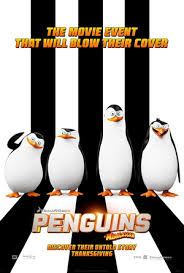
PENGUINS OF MADAGASCAR
US, 2014, 90 minutes, Colour.
Voices of: Tom Mc Grath, Chris Miller, Christopher Knights, Conrad Vernon, John Malkovich, Benedict Cumberbatch, Ken Jeong, Peter Stormare, Andy Richter, Danny Jacobs and Werner Herzog.
Directed by Eric Dunnell, Simon J.Smith
Everybody enjoyed the appearances of the penguins in the three Madagascar films. They were, to say the least, disruptive. They also had a lot of zany dialogue and found themselves in all kinds of humorous, slapstick, action-filled sequences, with a propensity for undermining the plans of the key animal characters. So popular were they that a number of short films were made in which they starred and they had their own television series. Here they are again, with their own film.
In the past, the Penguin said they had never been to Antarctica. But that does not matter for this film. It re-invents their origins. In fact, the film opens with a March of the Penguins, reminding us of the documentary that was extremely popular, familiarising audiences around the world with the habits of penguins, their coping with the seasons, their march through the ice continent, then mating, their producing eggs and chicks. Here we see them in a long, long file, marching, conformed to the traditions – with a lot of dialogue indicating that they have no idea why they should be so conformist and following these traditions.
It is in this context, that Skipper questions the traditions and decides to be independent, taking with him his pals, Kowalski and Ricco. They see an egg rolling down the snow cliffs and try to save it – and from it, emerges the rather cute penguin, with the nice voice, Private. We have to acknowledge the skills of Tom Mc Grath, Christopher Knights, Conrad Vernon, Chris Miller who really do have distinctive styles to bring these penguins to lively interchanges.
The main audiences for the film will not appreciate the joke at the beginning – but film buffs who appreciate the idiosyncratic career of director, Werner Herzog, will enjoy the fact that he is the introductory voice-over, reminding audiences that he made a film about Antarctica, and that he is a director who has made extraordinary physical demands of those who appear in his films. He has some very jokey lines about documentary makers, cuteness of penguins, and is not above showing us how directors can be bit unscrupulous in engineering the scenes, by hitting the three penguins over the cliff!
The penguins encounter four international agents, led by Classified (Benedict Cumberbatch) and an assortment of animals. They are recruited to try to combat a mad Professor who wants to transform all the animals, get rid of them, starting with penguins. He is a mad scientist who transforms himself into a giant octopus, a creature who readily suggests villainy, and has crew of small octopi to do his dirty work, as well as some vast machines. After some international visits, the focus is in New York City, the transformation of penguins into mutants, the confrontation with Dave – or other names starting with D because Skipper doesn’t always remember the correct name.
And, while Herzog’s appearance might be a surprise to many, the voice of Dave is also a surprise, John Malkovich.
The agents run away at first, calling it re-grouping, but finally come to the aid of the penguins, their transformation back to normal, the vanquishing of Dave and the other octopi.
The screenplay, after all, is rather conventional, presenting a familiar enough plot, but aiming for entertainment for younger audiences rather than for their parents.
1. The popularity of the Madagascar films? The contribution of the penguins? The later short films and television series?
2. Dreamworks animation, bright colours, characters, action?
3. The quality of the voice cast?
4. The references to the past, the glimpse of the animals from Madagascar, the song Movin’ (and Skipper’s complaint that it irritates him)? The re-appearance of King Julien?
5. The opening, Antarctica, the penguins and memories of The March of the Penguins, the long line, the voices of conformism, without knowing why they were conforming? Audience response to penguins, to the Antarctic?
6. The jokes with Werner Herzog, his voice-over about Antarctica, his documentaries, his contributing to the descriptions and the penguins’ cuteness, about the action, the documentary makers appearing, giving the penguins a push?
7. The egg, its rolling down the snow, onto the boat? Skipper and his independence stances, Kowalski and his blunt expressions of the truth, Ricco and his humour? The egg falling, onto the ship, Private emerging, the eggshell, the cuteness, the ship exploding?
8. The penguins floating on the iceberg, the encounter with the group of agents? Classified and his leadership, the other members of the group, Eva, Corporal the bear, their voices, Kowalski attracted to Eva, the discussions, the chewing of the crunchy snacks? The commission, helping, the interaction between the penguins and the other creatures?
9. The mission around the world, international? Races in Venice, crashing in Hong Kong? Coming to New York?
10. The professor, mad, world domination, Dave and Skipper mixing up the names starting with D? Taking the form of an octopus? The small octopi as his minions? Anti-cuteness?
11. Assembling the penguins, in New York? His machine? Operational? The Medusa Serum? Transforming the penguins into mutants? Including Skipper, Kowalski and Ricco? Private and his not being transformed, his observing, anxiety?
12. Private, calling out to the other penguins, trying to save them, getting into the machine, running low on batteries, Ricco and is going to the shop, delaying, with the crunchy snacks?
13. Private, the last minute, the transformation and the saving of the penguins? The return of the agents and helping?
14. The character of Dave, his background, mad plans, anti-animals, to rid the world of animals? His mutating into the octopus? The octopus as the villain, tentacles, shapes, movements? His dialogue and wanting world supremacy? The small octopi and their confrontations with the penguins?
15. Private and his victory, the threat from Dave, his being caught in the globe, the little girl taking him as a souvenir?
16. The humour of the screenplay, the allusions to movies and stars?
17. But a straightforward plot, designed for entertaining young children?
Published in Movie Reviews
Published in
Movie Reviews
Tagged under
Saturday, 18 September 2021 19:53
Serenity
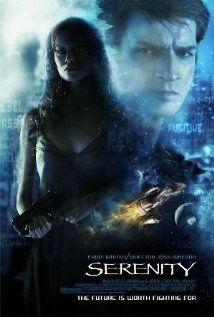
SERENITY
US, 2005, 119 minutes, Colour.
Nathan Fillion, Gina Torres, Chiwitel Ejiorfor, Summer Grau, Alan Tudyk, Adam Baldwin.
Directed by Joss Whedon.
Though very popular, Star Trek is still an acquired taste. The short-running series on US television, Firefly, was also an acquired taste, too late to save it but strong enough to get the green light for a big movie.
Serenity is a space ship in a universe where human behaviour, despite the technology, is not too much different from our own, five centuries hence, used for raids but embroiled in a parliamentary attack in the galaxies. There are the overtones of Star Trek with an MTV style which should prove engaging for younger fans. However, the complicated plotline is not served so well by the television visual style nor the granite-jawed (on wooden performers!) deadpan TV soap opera acting-style. British Chiwetel Ejiofor stands out, acting-wise, as the villain.
Loud and brash, violent and flashy – reassuring many of us that it is probably better living now than in this future.
1. The popularity of the television series, Firefly? The regard for writer-director, Joss Wheedon? The many fans?
2. Space, travel, warfare, peace? The influence of Star Trek, Star Wars?
3. The title, the ship – and the hopes for peace and calm?
4. The worlds, the universe: planets, stars, the vast space, travel, rulership, military, authorities, independence? The planets and their variety of terrain? The musical score?
5. The opening, the teacher, seemingly calm and serene, the totalitarian approach, the transformation of the teacher, River and her independent response? The change, disciplining River? Control of her mind? Her telepathic qualities? Brainwashing, The Operative and his role?
6. Simon and River, support, River imprisoned, Simon and the escape? Going to Serenity? Mal, taking River into the spaceship?
7. River, psychic, those for her, against? What she saw? What she felt? Her personal fragility, yet her martial arts skills? Fighting to defend herself?
8. Mal and Serenity, the Han Solo type? Warrior, the urge for peace? Attitudes towards the authorities? His relationship with his crew, the navigator, the husband and wife team, Jayne and his attitudes, suspicions? Action?
9. The crew, their attitudes towards River? Treatment? Confinement? Suspicions and hostility?
10. The travel, the dangers? Going to the different planets? Mal and his relationship with Shepherd, the past, ideas, his death?
11. Other planets, Dr Universe, the other doctors and their contribution?
12. Mal, his companion, coming to Serenity, love, her role on board, during the battles?
13. The Operative, his confrontation of River, his mission from the authorities? Travelling, his powers, obedience of loyalty? Finding River? The confrontations? Seeing him in action, the discussions with Mal, Mal defying him?
14. The battles, the Reavers in space, their travel, destruction? Death and survival?
15. Mal, The Operative, fighting, challenge, changing – and The Operative going into a different future?
16. River, her brother, the relationship, his saving her, the fights, the action – in the future?
Published in Movie Reviews
Published in
Movie Reviews
Tagged under
Saturday, 18 September 2021 19:53
Without a Paddle
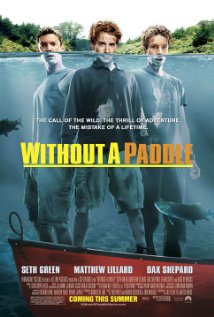
WITHOUT A PADDLE
US, 2004, 95 minutes, Colour.
Matthew Lillard, Seth Green, Dax Shapard.
Directed by Steven Brill.
Well, we all know what waterway were are up when we have no paddle. This is what it is like when we have three adults who still yearn for their younger days and have failed to grow up emotionally – but that makes it sound much too deep for what it is, a raucous male bonding comedy with plenty of sex and excremental jokes. But, be warned, it takes the moral high ground much of the time and preaches about wasting opportunities in our lives and not being authentic. Perhaps that is why it has performed so well at the box-office, a blend of the silly and the profound.
It obviously has memories of Deliverance in mind as our three heroes go out into the wilds of Northwest America on a quest to find the treasure of D.B.Cooper in memory of a dead friend, go out on a kind of City Slickers’ outdoors maturing process, and meet, of all people, Burt Reynold’s as a reclusive mountain man. They also meet a bear who gives new meaning to the saying of what a bear does in the woods – he has to because this activity is in keeping with the name of that creek where you are without a paddle! There are gross hillbillies, a crooked sheriff and some bikini-clad ecological warriors.
You know whether you want to see it or not.
Matthew Lillard is one of the stars, toned down from a lot of his performances, especially in the Scooby Doo films. However, Seth Green is a good actor and a talented comedian who is generally worth watching.
Published in Movie Reviews
Published in
Movie Reviews
Tagged under
Saturday, 18 September 2021 19:53
Late Quartet, A/ Performance
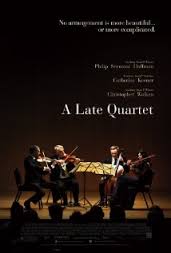
PERFORMANCE/ A LATE QUARTET
US, 2012, 105 minutes, Colour.
Christopher Walken, Philip Seymour Hoffman, Catherine Keener, Mark Ivanir, Imogen Poots, Nina Lee.
Directed by Yaron Zilberman.
Recently, there have been several films for older audiences, quality films like Amour, Best Exotic Marigold Hotel and, with themes of music, Quartet and A Song for Marion. Three have been British, one American. Performance is the American film, originally called A Late Quartet, but changed because of the release of the British film, Quartet.
The setting is New York City. Four members of the Fugue string quartet have being played together for 25 years. The leader of the quartet, Peter (Christopher Walken), is diagnosed with Parkinson’s Disease. (Some interesting scenes with interview and exercise with his doctor as well as explanations of how to deal and to cope with Parkinson’s.) Peter’s wife has died a year earlier.
He takes the news with great dignity, continuing his classes, a key scene being a lesson where he explains to his young students how he had met Pablo Cassals when young and, nervously, played for him, ashamed that it was his worst performance. He tells the group that he was praised by Cassals for his playing, and thought him hypocritical, just being nice to him. He goes on to say that he met Cassals later in his life and asked the master whether he remembered his performances for him. Cassals mentioned how he noticed variations of fingering and holding his bow from the usual playing and complemented him on his originality. That was what he had seen and praised. It is a moving story, nicely told.
In fact, Walken gives one of his most sympathetic performances, playing his role straight, a good and decent man, with a great love of music who has devoted himself for many decades to performance, especially in tribute to Beethoven’s opus 131, the Fugue - and movements are played throughout the film, explanations given as to the nature of the composition, and the reason for its being played straight through, very difficult for the players as well as their instruments.
The other members of the main cast are exemplary in their performances. We have come to expect a great deal from Philip Seymour Hoffman, showing great versatility in many different roles. Here he plays second violin and has come to a crisis, wishing to alternate with the first violin, played by Ukrainian-born actor, Mark Ivanir. Robert ( Hoffman), is married to the other violinist in the quartet, Juliet, and they have a daughter, Alexandra, who also plays the violin, takes lessons from Peter as well as from Mark.
Part of the drama in the film is Alexandra’s resentment towards her mother for being absent as she grew up, and having to travel around the world. She is closer to her father. Alexandra resents the perfectionism demanded by Daniel (Ivanir), in his lessons. However, he breaks through his normal reserve and begins an affair with the responsive Alexandra. This, of course, creates a crisis for her parents, with strong scenes of interaction with both.
But playing Robert gives Philip Seymour Hoffman a great opportunity to show a seemingly submissive of man, finally breaking out, wanting to play first violin and, in a moment of exasperation, betraying his wife who cannot understand what he has done and rejects him. In very dramatic and moving scenes he tries to explain what has motivated him, trying to assert himself.
Beethoven’s music is really the background for the film rather than a subject in itself though it is given quite some treatment. The thrust of the film is the drama between the different members of the quartet as well as a portrait of a man who accepts oncoming Parkinson’s disease, trying to play for as long as he can, then withdrawing in great dignity. Real-life cello player, Nina Lee plays herself, coming as the new cello player in the quartet.
While three of the characters are around the age of 50, Walken’s character is 70. Which means that there is a great appeal in the drama and the music for middle aged and older audiences.
1. The title? Music? Drama?
2. New York City, the music world, the world of studies, performance, homes, apartments? Exteriors? The jogging sequences? Real?
3. Beethoven and opus 131, the explanation given, the nature of performance, intercutting the music with the action? The demands, strings? The opus as an analogy for the action? No stopping, the tiring playing, instruments becoming out of tune, the need to work together?
4. The Fugue Quartet? The history of the quartet, Mark’s vision? Peter as leader and manager, Juliette and Robert sharing performance? Travel for 25 years, the many performances, the nature of a career in performance, musicians’ lives, practice?
5. The introduction to the players, coming onstage, playing? Peter and his difficulties in fingering? His visits to the doctor, the exercises, diagnosis? His acceptance? Treatment, medication, the Parkinson's disease group and sharing? His perseverance while accepting? The illness as a crisis point for each member of the quartet?
6. Peter, Christopher Walken's performance, his character, his relationship with his wife, her appearance in his imagination, singing? The long marriage? His interactions with each of the group? His puzzle about what was happening?
7. His work as a teacher, the enthusiasm of his students? His telling them the story of playing for Pablo Cassals, the musicians praise, his own estimates of his performance, meeting Cassals later and the reason for his praise, the good notes and the bowing?
8. Mark, migrant, his musical skills, playing first violin? The past, establishing the quartet, his wanting to work with a group, the pleasure of working as a team? A perfectionist? Having his notes, annotations? His relationship with Juliet in the past? Alexandra and her lessons, her criticism of him, the future and Peter's illness? The affair with Alexandra? Her taunting him and the effect? The rediscovery of his emotions? Robert finding out, punching him? Juliet and her being upset? Alexandra and her breaking off the relationship?
9. Juliette and Robert, their life together, the video of interviews with the members of the quartet and their watching it? Love, the long marriage, fidelity, Alexandra and her birth? Their life, careers? Alexandra and her complaints about her mother being distant, the travel? Alexandra and her closeness to her father, the plan to buy the violin, the auction sequence, the bids, Juliette walking out? The tensions? Juliette cold but concerned? Robert and his life, playing second violin not being enough?
10. Robert and his jogging, the encounter with the flamenco dancer, their talking, his going to see her performing, the tension with Juliette and his going to the dancer’s house, leaving his bag, his lies covering it, going to meet the dancer to recover the bag, Juliette’s arrival? His regrets, apologies, his being ousted from the house, having to fend for himself? Arguing with Mark, about first violin, his being humiliated? The issue of whether he had real or unreal expectations of his talent?
11. Juliette and her being upset about Peter, not wanting to go on, her anger with Robert, her anger with Mark, going to Alexandra’s apartment, discovering
the truth, the argument with her daughter?
12. Alexandra, her life’s experience, age, precocious, her playing the violin, her appreciating Peter’s classes? The audition for Mark, his criticisms of her? Going to his classes? Her criticisms of him? Mark giving her the violin from the auction? Her reaction to her mother, her mother discovering the truth, her assertion of independence? The decision to break off the affair with Mark?
13. Peter, his discussion with Gideon, the director of the trio, the request for Nina to take his place, the refusal? The final concert, Peter withdrawing, Nina taking his place –and Gideon in the audience?
14. The final performance, coming onstage, playing opus 31? Peter stopping, the explanation, the audience response, retiring with dignity?
15. A film of music, of performances? Of drama, life’s problems and consequences?
Published in Movie Reviews
Published in
Movie Reviews
Tagged under
Saturday, 18 September 2021 19:53
Hell Baby
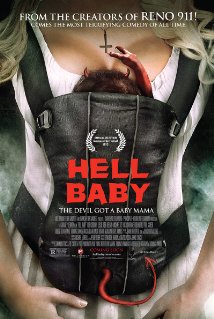
HELL BABY
US, 2013, 98 minutes, Colour.
Rob Corddry, Leslie Bibb, Keegan- Michael Key, Robert Ben Garant, Thomas Lennon, David Wain, Alex Berg.
Directed by Robert Ben Garrant and Thomas Lennon.
As the title might indicate, this is a film not to be taken too seriously. It is a parody, given the popularity of exorcism and diabolical babies in recent times (not forgetting Rosemary’s Baby in the 1960s and The Exorcist in the 1970s and the film traditions they started).
This film is in the vein of those small-budget, scatty, often crass, send-ups of popular movie genres like the Scary Movie series. This does mean that the audience is a little specialised, most serious moviegoers not even considering seeing these films, but popular enough in the multiplex theatres and on television. Some cinema buffs might like to check out these satires, their relationship to the originals and who decides to appear in them and direct them.
Both Roberts Ben Gary and Thomas Lennon have had their serious moments in many films as well as writing for popular comedies, especially Ben Garrant and the Night in the Museum series.
But, they are associated with the very broad and often crass television series and movies, Reno 911. Hell Baby is obviously in this vein.
Rob Corddry and Leslie Bibb have appeared in many a comedy, and spanned the serious films as well as the satires. Here they are a couple moving into a new house in New Orleans, discovering that its original title was House of Blood. They intend to renovate, make room for their forthcoming twins. One of the amusing aspects of the film is the continuous and unexpected appearance of the neighbour, F’remel (Keegan- Michael Key) who scares not only the couple but himself in his very frequent entries into the house and making himself at home.
Early in the piece, a mysterious and sinister presence turns the babies inside Leslie Bibb into diabolical twins. At times she seems herself, then at other times she becomes a possessed woman, played not for scares but for jokes. There is also a seemingly dead old woman who appears to Rob Corddry in bed, and then is found to be in some kind of coma. Lots of corny jokes in this regard. But it does bring two local policeman to the house, very often stupid, one dumb, the other dumber reducing themselves, laying down the law, becoming the butt of satire, often all too silly.
Though there are doctors and neighbours, the other two main characters are two priests, allegedly from the Vatican. One is Italian and the other is Mexican. How they got to New Orleans is anyone’s guess – although there are some scenes in the Vatican which are intended to give them some authority. And Lennon and Ben Garrant give themselves the opportunity to play priests.
Of course, they send up the priests in exorcism films. However, there is some initial parody where the priests, in their clerical clothes, show themselves to be rather gluttonous, enjoying huge specials at a takeaway café with the policemen, a touch lewd in their attitudes towards eyeing of women. Some of their remarks indicate that their time in the seminary may not have taken! The reason this kind of satire is introduced and the way that it works is that audiences are presupposed to have a good image of priests, their bearing, their language, their behaviour – and these screen priests are definitely the opposite. Hence the possibility for laughs and satire.
Ultimately, there are scenes of the exorcism, relying on audience familiarity with its screen rituals, the effect of the exorcism on the possessed person, memories of gore and bile in The Exorcist, with the spectacle of diabolical babies causing all kind of mayhem, no holds barred. Surprisingly, one of the priests is killed – by a distracted passing motorist!
Actually, it is bit better than many of the Scary Movies and other satires.
Published in Movie Reviews
Published in
Movie Reviews
Tagged under
Saturday, 18 September 2021 19:53
Human Capital/ Il Capitale Umano
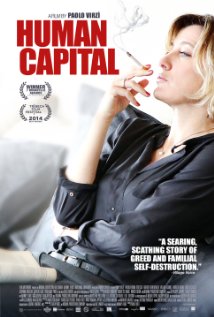
HUMAN CAPITAL/ IL CAPITALE UMANO
Italy, 2014, 111 minutes, Colour.
Fabrizio Bentivoglio, Valeria Bruni Tedeschi Fabrizio Gifuni, Matilde Gioli, Valeria Golino.
Directed by Paolo Virzi.
This is an impressive Italian film, a drama with a range of characters and a central mystery. It was the official entry Italian entry for the Foreign Language Academy Awards for 2014.
During the film, many audiences will be wondering what the meaning of Human Capital, the title, actually is. It is explained at the end of the film but indicating the meaning here does not spoil the plot in any way. Human Capital is the technical word for used by Italian insurance companies to estimate the worth for beneficiaries of a person who has died. It does seem a harsh and abstract phrase.
However, the film is not abstract at all. It opens with a party for socialites. One of the waiters cycling home is injured in a hit-run accident. It is not clear who the driver of the car was, whose car it was, and the screenplay offers several possibilities as the film goes on.
The screenplay is structured in three parts, each focusing on a central character, telling the story from their point of view, while advancing the narrative – although there is a six month period in the film between the accident and the move towards resolution.
The first story is that of Dino (Fabio Bentivoglio), a real estate agent, pushy and brash, who wants to have something more in life. He has a daughter, Serena (Matilde Gioli), who is studying. Dino is married to a psychologist, Roberta (Valeria Golino), his second wife. Serena is dating Giovanni, the son of a wealthy businessman and his former-actress wife. When Dino arrives at the mansion of the businessman, he is invited to play tennis and makes a success of it, asking for financial advice, which leads him to borrow heavily, lying about his money status. When he imposes later, asking for his money, he is fobbed off, and tries to rectify his situation by further lying and borrowing.
The second story is that of Carla (Valeria Bruni Tedeschi), the former actress, unhappy in her marriage, remembering happier days, especially when she wants to buy a run-down theatre and calls on a friend, a lecturer and director, to give advice to the board she sets up for the running of the theatre and its contribution to the town. She has a tenuous relationship with Giovanni, the son, but is open to his relationship with Serena. However, her husband is more preoccupied with his business than with her.
The third story is that of Serena herself, her relationship with Giovanni which is not as it seemed earlier in the film. He is irresponsible, drinking, going to parties – with his car, which raises all kinds of questions as to which car was involved in the accident and who could have been driving. There are some interesting twists which we do not anticipate.
The other interesting character is Luca, living with his uncle, becoming involved in his uncle’s drug-dealings, having his own personal problems – and a client of Dino’s wife, Roberta. It is in her waiting room that he encounters Serena, which leads to the final complications.
The film keeps the interest, throwing light on the wealthy class in Italy, the business dealings, especially with the financial crises in Italy. It also throws light on the less wealthy classes, their struggles, their ambitions.
For audiences who are on the lookout for strong, well-written and well-acted dramas, Human Capital can be recommended.
1. The title? The explanation given at the end? The definition by insurance companies, their criteria? The literal meaning? Symbolic meaning?
2. An Italian film, nominations and awards? An Italian story? Universal? 21st-century? 2010 and the consequences of the global financial crisis?
3. The settings, Dino’s world, ordinary? Carla’s world, affluence? The mansion, interiors and exteriors? The grounds? Tennis court? The old theatre? Shops? Social events? The school, the celebration? Luca’s world? The psychologist’s? Homes, parties, drugs, the neighbourhood? The musical score?
4. Structure: the opening, the school celebration, the waiter, the accident, the car leaving? The different chapters, the time lapses, six months? The focus on specific days? The interlinking of the chapters, through the characters relationships, business?
5. Dino’s story: his age, personal style, go getter, real estate? Divorcing his wife, the affair? Marrying Roberta? The news of her pregnancy? his daughter, Serena? The tensions? Dropping Serena at the mansion, his staying, talking with Giovannni, invitation to the tennis, asking about the fund, the scenes of his borrowing so much money, signatures and possibility for fraud? Investment? Giovanni dropping him? The visit to the house, the meeting, the news about the financial failure? The company gambling on Italian finances to drop? Dino’s reaction, the possibility of partnership with the other estate agent? Going to the dinner, Roberta wanting to go to the hospital? Serena, her computer, the memory stick, going to the theatre and the blackmailing of Carla, wanting a kiss? His future?
6. Carla’s story: introduction to her, her marriage to Giovanni, coming to the celebration? Her being upset? Going shopping, her whims, going to her friend’s shop, the souvenirs? Going to the theatre, the collapse, her going inside, the explanations, wanting to buy the theatre? Giovanni agreeing? The board meeting, the various members, the satire on critics and theatrical types? Donato, his coming with the film, the sexual relationship with Carla, memories of the past? Massimiliano seeing his mother? His concern, her guilt? In the theatre, Dino and the blackmail, her reaction to the kiss?
7. Serena’s story: audience expectations after seeing the other two chapters, finding out that suspicions were false? Serena and her father, her mother leaving home, cool towards Roberta, moving more to trust her? The relationship with Massimiliano, the break? At Roberta’s office, the encounter with Luca, his sketch, her attraction, the visit to his house, the accusation about the drugs, covering for his uncle, the sexual relationship, the phone call, his driving and the accident, not stopping? Serena covering for him? Her computer, the message, her father seeing it, her going to Roberta, the news of Luca’s suicide attempt, her going?
8. Massimiliano, at school, the relationship with Serena, his father and contempt, his mother and seeing her with Donato, not getting the award? His drinking, everybody suspecting him of the hit-run?
9. The theatre board, the variety of types, the discussion, points of view, Carla and her agreeing with everyone? Carla breaking with Donato and his petty response?
10. The school, the celebration, the priest, the items, the award and the candidates?
11. Roberta, marrying Dino, pregnant, the contractions at the dinner? Her work with Luca? Serena turning to her, their going to Luca’s house?
12. Luca, mental state, his uncle, the drugs, covering for him, his art, the relationship with Serena, driving the car, not stopping after the accident, his attempted suicide? Accepting the prison sentence? Serena going to see him?
13. The fourth chapter, Human Capital, the information about Luca, his sentence, the family and the deal with the insurance, the victim’s family, receiving money as human capital?
Published in Movie Reviews
Published in
Movie Reviews
Tagged under
Saturday, 18 September 2021 19:53
What We Did on Our Holiday
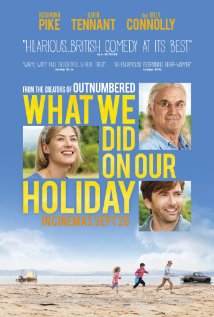
WHAT WE DID ON OUR HOLIDAY
UK, 2014, 95 minutes, Colour.
Rosamund Pike, David Tennant, Billy Connolly, Ben Miller, Annette Crosby, Celia Imrie, Emilia Jones, Amelia Bullimore, Bobby Smallbridge.
Directed by Andy Hamilton, Guy Jenkin.
The title sounds like one of those essay topics which desperate teachers hand out to their students as the school year begins. If the children in this film had to write such an essay, it certainly wouldn’t be your ordinary themes, action or enjoyment.
The film is billed as a comedy and there is a great deal of humour in it, verbal, action, eccentric characters. However, the mood does change in the middle of the film and while there are some humorous and absurd situations, there is also a great deal of pathos.
The film opens with lovely Scottish loch scenery and a lone fisherman in a boat – who is then revealed as Billy Connolly, the grandfather of the family, not well, but about to celebrate his 75th birthday party. And he is not always fishing as there is a portable TV in his boat as well! But that is justified as he was a prominent footballer in his past, with a still strong reputation.
And then the film transfers to busy London, mother and father trying to organise their three children to get away to Scotland for the celebration. David Tennant (after Doctor Who) is Doug, the father, one of grandfather’s sons, the younger. His wife, Abi, is played by Rosamund Pike (just before she became Gone Girl). They seem fairly desperate, and it emerges that they are not living together, mainly his fault, but they are trying to keep up appearances for the sake of the children. Not that the children aren’t alert, but they also their own eccentricities, the older girl, Lottie, takes a diary with her and has a desperate need to tell the truth, utterly serious. The little girl, Jessie, has a propensity for taking things with her, this time favourite bricks and stones! And Michael, the son in the middle of the two sisters, is very much involved in Viking lore, something which becomes very important in the latter part of the film. After much excitement and getting away, the inevitable question is asked, “are we there yet?” – With the answer that they have only just got to Watford (outer London for those who don’t know it).
Meanwhile in Scotland, the other son, Gavin (Ben Miller), takes himself very seriously and is preparing to host a party in his father’s honour. In the meantime, there is eccentricity in this household as well, the audience later seeing a video with Gavin’s wife absolutely losing it in a supermarket (which, of course, goes viral on You tube). Gavin thinks his son, Kenneth, something of a nerd, which he may well be, but he has a real talent for playing the violin. And grandfather genially loves all his grandchildren.
When a crisis occurs in the middle of the film, and the party is about to begin, the musicians are playing, the guests are arriving, including the local laird whom they are all trying to impress, there is a fair bit of chaos, the children having made a decision which they are standing by, and most of the adults not believing them. The police are called in. The media have a field day, hounding the family, the adults in turn going out to try to pacify the media, only making a mess of their interventions. And a child welfare officer also turns up to interrogate the children.
This review has tried to be very careful in not revealing the twist in the middle of the film, so for those the who decide to go to see it, there are very entertaining performances, some witty dialogue, Billy Connolly as his usual self with a touch of sentiment, unexpected interactions – and, with the hope of some happy ever after after, perhaps, more than a touch of counselling!
1. Family – the film about a family, for family audiences, the impact for parents, children?
2. The title, like a class essay after the holidays? The irony of the title for this kind of film? The shift in tone halfway through?
3. Scotland, the beauty of the lake, fishing (with a TV in the boat), the beauty of the countryside? The Scottish mansion, the beaches? The musical score?
4. London, the suburbs, the streets, cars, hassle, Michael and the Vikings? Jesse and her being obtuse, wanting to bring bricks and stones? Lottie prim, with her diary? The parents, the separation, bickering? On the motorway – ‘are we hear yet?’, and only at Watford?
5. Abi and Doug, the marriage, the children, arguing, try to keep face in front of the children, telling lies? Doug’s affair? Abi’s language? The urging of lies for grandpa on his birthday? Issues of the keys, Doug not able to have them without permission? The argument about staying overnight, the hotel?
6. Gordie, Billy Connolly, his age, suffering from cancer, his 75th birthday? Fishing, watching the TV? His relationship with Gavin and Margaret? With Kenneth? Thinking his son a tightarse, the touches of depression? Kenneth, playing the violin for Gordie? Put down by his father? The preparation for the dinner, the tent, his changing the seating places?
7. The arrival, the pretences, talk, Doug and Gavin and their relationship? Tensions? The children? Gavin and his bluntness, Jessie and her taking the keys?
8. The children, going to the lake for Gordie, talk, happy, the reality of the family, the boat? Gordie and his collapse? The Viking ritual, sad, sent out to sea on fire?
9. The party, the guests arriving, the anxiety, the servants, the music, the laird? the children and their different versions of Gordie’s death and the burial? Jessica speaking slowly? Doug and Gavin, the panic? Telling the guests?
10. The 999 call, Gavin and his being upset, the police and their reaction?
11. The arrival of the friend from New Zealand? His looking like a Viking, Michael’s reaction? His wanting to see Gordie, grief and his death?
12. Kenneth, playing the violin, the band, his not knowing what was going on? Breakfast, opening the window, the media looking in? the girl and the kiss?
13. Margaret, the Youtube clip, her breakdown in the supermarket, reactions? Gavin and his shock? Its being played over and over?
14. The supervisor, her interrogations of the children, tight, everything sounding odd, the Vikings, the holiday, Jessie holding her breath, Lottie and her book and the discussions about lies? Her return, Abi confronting her, but her being nice to Lottie?
15. Everybody talking, admitting the reality, the family’s shambles, family pride?
16. The media, the headlines, the blame, Gordie and his football reputation? The paparazzi outside? Doug trying to explain, Abi and her attempt, Gavin?
17. Everybody at the beach, the solution, playing in the water? Some resolution?
18. The title by the end of the film!
Published in Movie Reviews
Published in
Movie Reviews
Tagged under
Saturday, 18 September 2021 19:53
It's a Boy/Girl Thing

IT’S A BOY/GIRL THING
UK/Canada, 2006, 95 minutes, Colour.
Samaire Armstrong, Kevin Zegers, Sherry Miller, Robert Joy, Sharon Osbourne, Maury Chaykin.
Directed by Nick Hurran
This is a light comedy aimed squarely at the age group presented in the film, senior teenagers, Americans in high school thinking about going to college. Their parents and other adults might find the film a bit slight with a sense of déjà vu.
It is full of stereotypes, which is perhaps the point. It’s a mild comedy but it is also a moral fable about being oneself and not living up to other’s expectations.
Nell (Samaire Armstrong) is a born student with a love for poetry, expected to go to Yale by her snobbish mother. She is perpetually irritated by her next door neighbour, Woody (Kevin Zegers), the school jock and football star. They go through all the motions of the ladylike versus the boor.
And then, hocus pocus, their souls change bodies. Each of them has to learn what it is like, not only to walk in someone else’s shoes, but to manage in a body of the opposite sex. Woody then becomes quite prim. Nell slouches and slobs around. Friends are shocked. Parents bewildered. Woody-body has to play in the football final and become Homecoming king. Nell-body has to go for an interview for Yale and discuss poetry. Needless to say…
1. An entertaining comedy? Teenagers? Changing roles? New awareness? Target audience?
2. The American setting, the hometown, homes, neighbours? Schools? Prospect of college?
3. The title, indication of role reversals, changing bodies, the girl trapped in the male body, a man trapped in a girl’s body?
4. Nell and Woody, in themselves, as neighbours? The two families? The portrait of each of the parents? Sharon Osbourne in a cameo role?
5. Nell, poised, sensitive, studious, her plans for Yale? At home, at school? Reactions to Woody, thinking him a slob? Her relationship with her parents?
6. Woody, the school jock, good at football, slob attitudes? Attitudes towards Nell? His own friends, football world? His relationship to his parents?
7. Nell and Woody together, clashes? Going to the Museum? The Aztec God? The effect?
8. The body changes? Woody and his reaction to breasts? Nell and her reaction to having a penis? The jokes about body changes, awareness of the body, bodily functions, differences for males and females?
9. Nell and her becoming Woody, the demands on her, his friends, his plans, reacting to him?
10. Woody, becoming Nell, the demands on him, a different world, different school world?
11. The reaction to their parents, at home – and the change happening for a week?
12. The interactions between the two, changes in sensitivities, perspectives? Nell realising how snobbish she was? Woody admitting his jock attitudes?
13. Back to normal? The two understanding each other, the romantic response? Nell and her postponing her going to college? Woody postponing? Time together – change in the future?
Published in Movie Reviews
Published in
Movie Reviews
Tagged under
Saturday, 18 September 2021 19:53
Kabul Express
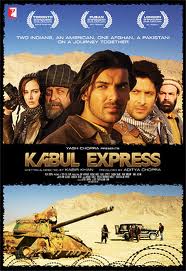
KABUL EXPRESS
India, 2006, 105 minutes, Colour.
John Abraham, Arshad Warsi, Salman Shahid, Linda Asenio.
Directed by Kabir Khan.
Interesting to see this adventure set in Afghanistan with an Indian audience who chuckled a lot at the dialogue and the references. They really enjoyed it, especially with Indian model and star, John Abraham, hero of several big Bollywood movies, at the centre.
This is India cinema being more serious than usual, though it is interesting to compare how several Iranian directors (especially the Makhmalbaf family films, Kandahar and At Five in the Afternoon) have made films about recent events in Afghanistan. The Iranians, neighbours to Afghanistan, are very serious with a tradition of documentary and exploring issues in depth
The Indians are also serious but there is a certain light-hearted treatment even in perilous situations. John Abraham and Arshad Warsi are two ingenuous TV journalists who turn up hoping for a story and get more than they bargained for. Encountering the Taliban (it is November 2001), they are dismayed at the violence, bloodshed and repression. When they are abducted by a Taliban Pakistani who wants to go home, they begin a road journey that gives them a more realistic picture of life in the mountains and the desert. They are joined by an American photographer which gives the opportunity for comments about American attitudes, foreign policy and the bombings.
In fact, the politics of the area are explored, the Taliban, the Mujahadin, the war lords, the Pakistanis, the aftermath of the Russians and the Americans.
The location photography is magnificent. Audiences will feel that they have travelled through the country.
The film is ultimately on the side of humanity, reconciliation and peace. The journalists get to know their captor and find that he has a story, that he is not simply a fanatic or an ideologist.
Not as fine-tuned as glossily-crafted as bigger budget films but it offers audiences familiar with the countries and the wars from the media a chance to give more thought to the issues.
1. The film made in the years after 9/11 and the war in Afghanistan? The title?
2. An Indian film, perspectives on Afghanistan, on Pakistan? On the Taliban? On the American presence in Afghanistan?
3. The photography, the beauty of the locations, mountains, deserts, the road from Afghanistan to Pakistan? The musical score?
4. The focus on the journalists, their personalities, characters, not being briefed, going on the track, road journey, looking for a story? Their interactions
with each other?
5. The Taliban Pakistani, his character, his experience, Taliban attitudes, wanting to go home? Meeting the journalists, interactions with them, partly abducting them, partly freedom? His own understanding of the Taliban, having to change as he goes home? His transformation?
6. The American journalist, joining the group, her presence, interactions, with the Pakistani, with the journalists? The opportunity for many discussions about American attitudes, towards Asia, towards Pakistan, towards Afghanistan, the Taliban? The presence in Asia after 9/11, the conflict in Afghanistan? The perspectives on the US, critique of the US?
7. The background of Afghanistan, the Russian occupation, the Mujahadin, the Americans supporting them against the Russians, the emergence of the Taliban, the alleged sheltering of Osama bin laden, revenge and retaliation?
8. The Pakistani and the journey home, changes?
9. The audience, sharing the journey, Indian perspectives, worldwide perspectives, better understanding, the critique of the challenge?
Published in Movie Reviews
Published in
Movie Reviews
Tagged under
Saturday, 18 September 2021 19:53
Taken 3
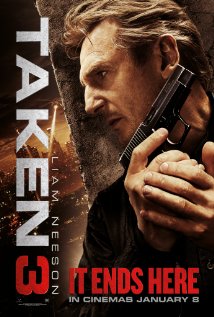
TAKEN 3
US, 2014, 109 minutes, Colour.
Liam Neeson, Forrest Whitaker, Famke Janssen, Maggie Grace, Dougray Scott, Andrew Howard.
Directed by Olivier Megatron.
Who would have thought there would be three Taken films? In the first, Bryan Mills, a solid and sympathetic Liam Neeson, finds that his daughter is kidnapped in Paris and that he has to find her, s drawing on his skills in detection and combat action in his past Secret Service, before she is sold into sexual slavery. Plenty of action, much of it violent, created by French writer-director, Luke Besson and directed by Pierre Morell.
Besson and writer Robert Mark Kamen got together with director, Olivier Megatron (a distracting thought is that his name sounds as if it is one of the Transformers) for a sequel, Taken 2, This time Mills’ wife, Famke Janssen, was kidnapped. Much the same plot except for some spectacular location photography in Istanbul and throughout Turkey.
Again Besson, Kamen and Megatron combined for this sequel. Since Mills had only one daughter, who could be taken in the third film? Apparently Liam Neeson did not want an abduction this time, so there is not. Rather, there is a murder, and the whole action is set in Los Angeles. Brian Mills goes through the same anguish as he did in the other films, relentlessly seeking out the murderer, which brings in subplots of arms deals, business companies and blackmail, loan sharks and violent demands for repayment, the Russian Mafia. Mills is deceived a couple of times, being set up not only for the murder, but for the hunting down of the Russian criminals.
This time the Los Angeles Police are a bit slow, going by the book, being fairly certain that Mills is the suspect that they are after, concentrating on him rather than the subplots which, eventually, they have to do. It is Forrest Whitaker who plays the main police chief.
Mills wife, Famke Janssen, has married again, to businessman, Stuart (Dougray Scott), who is not very happy about her keeping contact with her former husband, and Mills fostering that contact. In the meantime, Mills’s daughter, Kim (Maggie Grace), is pregnant but is wary of telling her father. Needless to say, the Mafia thugs are after as well.
There are some twists in the plot – which may make us not so alert to some of the improbabilities and holes in the plot. Nevertheless, this is an action show, detection show – and the last in the series.
1. The popularity of the series? The character of Bryan Mills? The story of his family, his career? Targets and rescue?
2. The stipulation that there be no abduction in this film? Rather, a police investigation, mystery?
3. The Los Angeles settings, apartments, the domestic sequences? Offices and business? The police? Locations? The musical score?
4. The prologue, the abduction of the worker, the Russian Mafia, the office, the thugs, the criminal, opening the safe? No money, putting the man in the safe?
5. The police, Los Angeles, Dotzler, on-the-job, going by the book, steps in detection? Mills as suspect? The attempts at rest? The CCTV, the documents? His persistence? Demand her evidence? The issue of the bagels and his not suspecting Mills?
6. Mills, buying the panda, Kim and her birthday, discovering she was pregnant, her relationship with Jim? Not telling her father about the pregnancy? His taking back the panda? Her relationship with her mother?
7. The situation, Lenore and Stuart, the marriage, her anxiety, the phone call from Bryan, visiting him, the discussions, leaving, the continued love, his love? With Stuart, at home? The phone call, the request for bagels, Bryan going home, finding his wife dead? The police, his eluding them?
8. His detective work, examining the CCTV, reconstructing what happened? The tattoo on the villain’s hand?
9. Bryan, the arrest, the evidence, his skill in getting away, flushed away? Going to his friend, organising his disappearance? The messages to Kim, reassuring? Arranging to meet her? Interactions with the police, with Stuart?
10. The CCTV, the Russians, the abduction of Lenore? Responsible for her death?
11. The use of GPS, surveillance, the police following, keeping tabs?
12. Stuart, his marriage to a Lenore, suspicions of Bryan, visiting, threatening him? The deaths? Insurance policies on himself and his wife? His being the businessman, his debts, his past contact with the Russians, arms deals, some successful, some not? His shrewdness in playing Bryan, steering him against the Russians? The setup in the building, confrontations, shootings and death? The revelation of the truth, getting on the plane, the attempt at leaving, Bryan’s car stopping the plane on the tarmac?
13. The Russians, the boss, money lending, thugs for hire, in action? The boss, his penthouse, the women, the confrontation with Bryan? The fight? His death?
14. Bryan, his age, his past, skills, fights, guns, the big man? Plans?
15. Going to the building, the phone call, Dotzler and his following?
16. The resolution, Bryan as hero, reunited with his family? The defeat of the Russian villains? Stuart‘s imprisonment? Kim and her pregnancy – and happy ever after?
Published in Movie Reviews
Published in
Movie Reviews
Tagged under